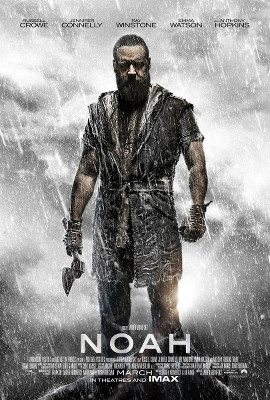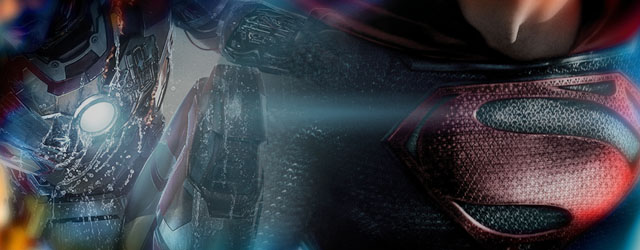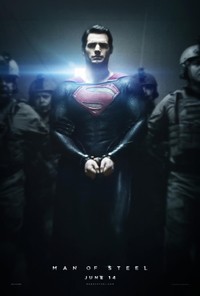 (spoilers ahead)
(spoilers ahead)
I've been thinking a lot about Darren Aronofsky's latest movie, NOAH, a high fantasy rendition of the old testament tale about history's greatest hoarder. I thought at first that meant it was a "smart" film, or at least a "heady" film the way Aronofsky's THE FOUNTAIN was -- but the more I tried to justify that, the more that label didn't make sense. That might be the overall problem most audiences have with NOAH: it doesn't fit conveniently under any of these labels. It's not a reverent, historical bible movie. It's not an irreverent, critical provocative movie. It's just a suspenseful thriller using common Christian mythology as a backdrop.
It's a great thriller, though. There's so much murky conflict and tension that, when transposed onto biblical epics, become extremely high stakes. Suddenly it's not about a man trying to protect his family, it's about god's chosen prophet fighting for all mankind. That is as big of an upgrade as you can make. Yet even that's nothing compared to the second half conflict of a psychotic obsessive deciding to kill his own grandchild -- that gets upgraded into a man deciding the human race deserves to be ended. Holy shit, right?
That's the point where this becomes a crazy fucking movie in the best way. It's unsettling, but not for any big deep biblical reasons, it's just a well done and sensible turn of the main protagonist into the main antagonist. It's all in the structure and in the characterization, not in anything having to do with the gravity of bible stories. The thing is, it could have been. And if it were, it would be an even more compelling story.
Here's the premise of the second act conflict: Noah, realizing that the evil is within all people, not just the descendents of Cain, understands that god did not ask him to survive and restart the human race. God asked him to survive, save the animals, and then live out the remaining generation of the human race. Wither on the vine. No humans in the new Eden. So he doesn't find his sons wives and he accepts the barren wife of his eldest, Ila played by Emma Watson. When the secret intervention of his somehow-magical grandfather, Methuselah, allows Ila to get pregnant, Noah realizes that this undermines the creator and his plan for the human race to end. So now he has to kill the baby if it's a daughter that might allow mankind to continue (spoilers: it is. In fact, it's two daughters.)
The crazy tension is in Noah's degradation into a wild-haired, wild-eyed madman. He looks like the craziest fucking hobo you've ever seen and he's determined to kill this baby when it finally comes out and they find out its gender.
(Side note: they do a flash forward, but can you imagine those 9 months of living with crazy hobo dad Noah? Sharpening his sword staring at them, constantly arguing with his son and daughter at the dinner table, yelling with his wife about why she's making baby boots. "YOU KNOW I'MMA KILL THAT BABY, RIGHT? RIGHT???" Talk about inter-family stress.)
Of course there's not going to be any on-screen infanticide, so while Noah comes as close as holding a knife to a sleeping baby's face, he finds that he feels only love in his heart and cannot stab a baby. The resolution is basically a Deus Ex Machina: he is convinced that god did not choose him to end mankind, but to judge mankind as worthy and to guide them into the ways of kindness. It is further validated by rainbow pulses emanating from the sun at the end of the movie.
That's all well and good, and it's a feel good ending that I'm sure will please some audiences. But on some level, I wanted a really dark and complex ending. Not one where Noah kills babies -- that's a little ridiculous for my tastes. I still wanted Noah to have a change of heart, but one where god doesn't. Imagine this:
Noah decides to spare his grandchildren. He just can't do it. So the end result is that the human race continues into this new world in direct defiance of the will of god. This was not part of his will, he doesn't change his mind, he's kinda pissed that people continue to exist when he wanted the new world to be the domain of the giraffes or whatever. So maybe that's why he takes away his blessing -- his direct intervention and all the magic that comes with it. That's why there are no warriors with flaming swords, no arch angels, no direct intervention via miracles.
Noah and his family, faced with this, decide that they have to do their best to live up to the challenge of creating a human race based in kindness, to prove that they are worthy of the creator's blessing. They have to make an argument for mankind by living as decently and as responsibly as possible. And that's the end of the movie. They live in a colder, darker world, but they're going to do their best to show that humanity is worthwhile. Think of how stirring that theme could be. You can even go so far as to extend it to the audience -- leave this theater, go forth and prove that mankind deserves to be here.
Obviously that's a little more hopeless, a little more controversial, and someone would get mad that god is made out to be the bad guy and that you are in fact rooting against him. So I understand why they went that route. In fact, after reading that there was some argument about the film's final cut, I wonder if this was the original ending.
Other observations:
- I love that since this is pre-history and somewhat of a fantasy world, but definitely not medieval, they can do whatever they want in terms of world-building. So Noah is wearing a stylish sleeveless leather hoodie and everyone's got these dope denim shawls or whatever.
- There's a hilarious scene where Noah, in his post-flood misery and traumatic stress, gets drunk off his ass. I know why they show it -- it's cinematic shorthand for "this guy is real messed up and sad" -- but it's hilarious because in order to explain it they basically show Noah inventing wine. The arrive in the new world, they show him picking grapes, then they show him sputtering wine, alone, in a cave, falling asleep naked on his face.
- I really would love to see more high fantasy films in biblical settings like this. There's a lot you can do. There's one quick flashback of Enoch or whoever fighting the armies of Cain, who are trying ot kill these stone-clad Fallen Angels, and he uses The Flaming Sword of Michael to slay them. It's dope. I want a video game.
- The fallen angels are basically Rock Ents.






